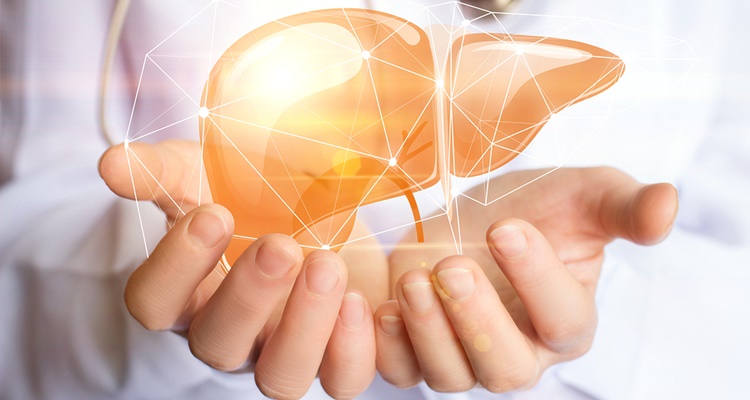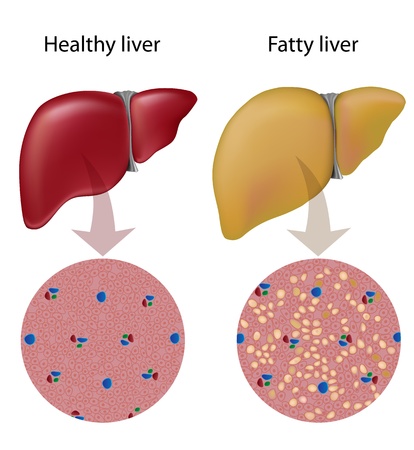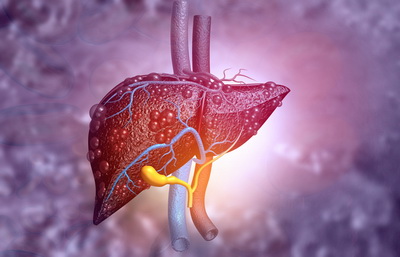Liver Disease & Natural therapies in Vancouver


Liver disease encompasses a wide range of conditions that impair liver function, including fatty liver disease (both alcoholic and non-alcoholic), hepatitis, cirrhosis (advanced scarring of the liver tissue), and liver congestion. As one of the body’s most vital organs, the liver is responsible for detoxification, hormone metabolism, digestion and nutrient storage. When the liver becomes overwhelmed, inflamed, or damaged, it can no longer perform these essential functions effectively, leading to a cascade of health issues. Liver disease often develops gradually and may go unnoticed in its early stages, making early detection and support crucial. From a naturopathic perspective, liver disease is viewed not just as a localized organ issue but as a reflection of systemic imbalances that require a comprehensive, individualized approach to healing.
The two common types of liver disease include:
1. Non-Alcoholic Fatty Liver Disease (NAFLD)

This is the most common chronic liver condition in North America, particularly among individuals with metabolic dysfunction. It occurs when excess fat accumulates in liver cells, not due to alcohol, but primarily due to insulin resistance, obesity, poor diet, and a sedentary lifestyle.
There are two main stages:
- 1- Simple steatosis: Fat accumulation without inflammation or damage.
- 2- Non Alcoholic Steatohepatitis: Fat accumulation with inflammation and cellular damage, which may progress to fibrosis, cirrhosis or liver cancer.
2. Alcoholic Liver Disease (ALD)
ALD is caused by excessive and chronic alcohol consumption, which damages liver cells and promotes inflammation, fat accumulation, and eventually fibrosis and cirrhosis. ALD can progress through stages such as alcoholic fatty liver (steatosis), alcoholic hepatitis, or cirrhosis- permanent scarring and loss of liver function.
Alcohol significantly disrupts liver function by producing toxic byproducts, depleting antioxidants, and increasing inflammation.
When metabolized, alcohol generates harmful compounds that damage liver cells, and promote inflammation. Simultaneously, it depletes glutathione, the liver's primary antioxidant, leaving it more vulnerable to oxidative stress. Chronic alcohol use also disrupts fat metabolism, leading to fat accumulation in liver cells and impairs the liver's ability to detoxify hormones and environmental toxins. Additionally, alcohol increases intestinal permeability, allowing endotoxins from the gut to enter the bloodstream and further burden the liver. Over time, these effects can lead to alcoholic hepatitis, fibrosis and eventually cirrhosis if alcohol intake continues unchecked. Treatment for ALD begins with complete abstinence from alcohol.
Symptoms of liver disease:
Liver disease is often silent in early stages. As it progresses, symptoms may include:
Laboratory testing
Liver Disease Naturopathic Treatment
Nutrition and Diet

A liver-supportive diet is foundational in treating liver disease and promoting overall detoxification. Emphasis should be placed on whole, unprocessed foods rich in antioxidants and phytonutrients. Cruciferous vegetables like broccoli, kale, brussel sprouts, and cauliflower can help support detoxification pathways, while beets, garlic and onions enhance bile production and liver function. High-fiber foods such as flaxseeds and leafy greens can help support gut-liver health. Incorporating high-quality protein sources (e.g., wild-caught fish, eggs, legumes) and healthy fats (eg., avocados, olive oil, nuts, seeds and omega 3-rich foods) can reduce inflammation and improve fat metabolism in the liver. High intake of refined carbs and fructose-especially from soft drinks and sweets- contributes to NAFLD and should be avoided, along with processed foods, trans fats, artificial additives,and alcohol, all of which place a heavy burden on the liver. Staying well-hydrated by drinking adequate water throughout the day also supports optimal bile flow and detoxification.
Supplements:
Supplements such as N-acetylcysteine(NAC), glutathione, and milk thistle can support phase 2 detoxification pathways. Vitamins like B6, B12 and folate aid methylation and detox processed.
Additionally, antioxidants such as vitamin C, curcumin, and omega-3 fish oil can provide anti-inflammatory effects and protect the liver against fibrosis.
Lifestyle and detoxification support
Regular movement promotes circulation, lymphatic flow and insulin sensitivity. Sweating therapies- saunas or other methods can aid detoxification.
Stress Reduction
Chronic stress can impair liver detox pathways; adaptogens like ashwagandha or rhodiola may support adrenal function.
Gut Liver Axis Support
the liver and gut work synergistically. Dysbiosis or gut inflammation can increase liver burden. Supplements such as probiotics, L-glutamine, and soluble fibers can help heal the gut, while bitters and digestive enzymes can improve fat digestion and toxic excretion.
Liver disease can be silent but progressive. Naturopathic treatment offers a whole-body approach that addresses diet, lifestyle, detoxification, and gut health to restore optimal liver function.
If you have been diagnosed with a liver condition, including fatty liver, or are concerned about your liver health, book a consultation today with one of our experienced Naturopathic Physicians.
Reference
Semmler, G., Datz, C. and Trauner, M. (2023) Eating, diet, and nutrition for the treatment of non-alcoholic fatty liver disease, Clinical and molecular hepatology. Available at: https://pmc.ncbi.nlm.nih.gov/articles/PMC10029946/ (Accessed: 04 April 2025).
FAQ
Liver disease refers to any condition that causes damage to the organ and prevents it from functioning well. The most common problem include non-alcoholic fatty liver disease, hepatitis A, hepatitis B, hepatitis C, cirrhosis, and hemochromatosis. The organ is approximately the size of a football and is located just below the rib cage on the right side of the abdomen. This critical organ is essential for food digestion and in ridding the body of toxic substances. Learn more about this disease, its symptoms, and what natural treatments are now available to help treat and manage these serious conditions.
It can be inherited or can develop from various factors that damage the organ, such as alcohol use or viruses. If left unchecked, liver damage can result in scarring (cirrhosis) which can lead to its failure. The most common symptoms include:
If you have been diagnosed with elevated liver enzymes but no identified underlying cause, it is important to make some basic diet and lifestyle changes to improve your liver health. If you are overweight or obese, losing weight can significantly reduce your risk of developing certain conditions, such as non-alcoholic fatty liver disease. If you already have NAFLD, a weight loss of about 10 percent of your body weight can reduce mortality. Also introduce organic fruits and vegetables, as well as supplements, into your daily diet. Fresh fruits and veggies contain the antioxidants needed to reduce oxidative stress.
Natural treatment of NAFLD starts with the reduction of free radicals using antioxidants. It can be useful to test your RBC glutathione levels to determine where you stand, especially if you have diagnosed type 2 diabetes. If the test shows that you have increased hydroxyl free radicals or damage to your organ, adding antioxidants and a supplement regime to your life can be very helpful. Also make other healthy changes, such as avoiding sugars, eating plenty of leafy vegetables, and eating GMO-free and organic. Avoid a high fat diet, high fructose corn syrup, and glyphosate which can contribute to a leaky gut.
While there is plenty of supplements on the market that claim to support a healthy liver, not all are made equal. Stick with the basics that have been proven helpful in cleaning up toxins in the body. Momordica, otherwise known as bitter melon, offers cleansing properties that help purify blood and improve its functions. It also helps support normal blood sugar levels. Curcumin is another supplement option that has been found to help people with certain liver conditions, such as NAFLD. Other excellent supplement treatment options include milk thistle, glutathione, NAC, and alpha lipoic acid.
A recent survey showed that nearly one third of people with chronic problems use one or more natural remedies to manage their condition, including vitamins and dietary supplements. While most supplements are natural and safe to use, it is important to speak with a licensed naturopathic doctor before taking any new supplements. A naturopathic doctor will help create a treatment plan that works for you and ensure that there are no dangerous interactions. Having a professional supervise and assist you through your treatment journey can also provide you with peace of mind.

Related Pages
Natural Treatment for Fatty LiverLiver Detoxification: Effective Ways to Support Your Liver Health…. Naturally!

